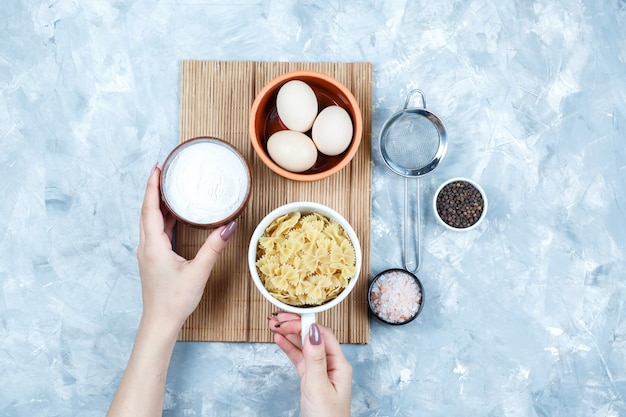Right, let's talk eggs! We all know they're a nutritional powerhouse, bursting with protein and other good stuff. But what about our furry friends? Can they enjoy a bit of egg-cellent goodness too? The answer, as with most things dog-related, is a bit more complicated than a simple yes or no.
As a seasoned dog owner (and a bit of a foodie myself!), I've learned the hard way that not all eggs are created equal when it comes to our canine companions. Over the years, I've experimented with various egg preparations, from scrambled to boiled, and I've had my fair share of "egg-sidents" (sorry, I couldn't resist!). But through trial and error, I've finally cracked the code to preparing safe and delicious egg treats for my furry friend, Buster.
So, grab your whisk, get comfy, and let's embark on this egg-citing journey together!
(Part 1) The Egg-cellent Benefits for Your Canine Companion

Before we get into the nitty-gritty of egg preparation, let's explore why eggs are actually a good choice for your dog. They're a fantastic source of protein, which is crucial for muscle growth and repair. Eggs also boast a healthy dose of essential fatty acids, which can contribute to a shiny coat and healthy skin. Plus, they're a good source of choline, a nutrient vital for brain function and development.
Now, don't get carried away and start feeding your pup eggs every day. Moderation is key. Treat them as a delicious supplement to their regular diet, not a replacement.
1.1 Protein Powerhouse
Think of protein as the building blocks for your dog's body. It's essential for muscle growth, repair, and overall health. Eggs are a complete protein, meaning they contain all the essential amino acids your dog needs. So, a little bit of egg can go a long way in keeping your pup strong and active.
1.2 Shiny Coat and Healthy Skin
Does your dog have a dull, lifeless coat? Eggs are packed with biotin, a B vitamin that promotes healthy skin and a lustrous coat. Feeding your dog a little bit of egg can add a healthy shine to their fur, making them look and feel their best.
1.3 Brain Booster
Eggs are a good source of choline, a nutrient that plays a crucial role in brain health. Choline supports cognitive function, memory, and learning. So, a bit of egg can help keep your pup mentally sharp and alert.
(Part 2) The Dos and Don'ts of Egg Feeding

Now, let's get down to the practicalities. Feeding your dog eggs is all about finding the right balance between nutritional goodness and safety. Here's a quick breakdown of the do's and don'ts:
2.1 Do: Cook the Eggs Thoroughly
This is a biggie, folks. Raw eggs can harbor bacteria like Salmonella, which can make your dog very sick. Always cook eggs thoroughly until the yolk and whites are solid. This ensures that any harmful bacteria are eliminated.
2.2 Do: Offer Eggs in Moderation
Remember, eggs are a treat, not a staple food. Too many eggs can upset your dog's stomach and contribute to weight gain. Stick to a few times a week, and keep an eye on your dog's weight.
2.3 Don't: Feed Raw Eggs
I know, I know, some people swear by raw eggs for dogs. But trust me, it's not worth the risk. Raw eggs can contain harmful bacteria, including Salmonella, that can cause serious illness in dogs. Play it safe and cook those eggs through.
2.4 Don't: Feed egg yolks Exclusively
Egg yolks are a great source of nutrients, but they're also high in fat. Feeding your dog only egg yolks can lead to weight gain and digestive problems. Always offer a balanced mix of egg white and yolk, or stick to egg whites only for a lower-fat option.
2.5 Don't: Overdo the Eggshells
Some people suggest feeding dogs crushed eggshells for calcium. While eggshells do contain calcium, they can also be a choking hazard and cause digestive issues. Stick to safe calcium supplements if your dog needs a boost.
(Part 3) Egg-cellent Recipes for Your Canine Companion

Now that we've covered the basics, let's get creative! Here are a few simple and delicious egg recipes that your furry friend will love:
3.1 scrambled eggs
Scrambled eggs are a classic for a reason. They're quick, easy, and versatile.
Ingredients:
- 1-2 eggs
- A splash of water
- Optional: A pinch of salt and pepper (ensure these are unsalted and free from onion powder or garlic)
Instructions:
- Crack the eggs into a bowl and whisk them until they're light and frothy.
- Add a splash of water to make them extra fluffy.
- Heat a little oil or butter (ensure it's unsalted) in a pan over medium heat.
- Pour in the egg mixture and cook, stirring frequently, until they're set but still soft and creamy.
- Let them cool slightly before giving them to your dog.
3.2 boiled eggs
boiled eggs are another simple and safe option. They're great for a quick snack or a special treat.
Ingredients:
- 1-2 eggs
- Water
Instructions:
- Place the eggs in a saucepan and cover them with cold water.
- Bring the water to a boil, then reduce the heat to low and simmer for 10-12 minutes for hard-boiled eggs, or 6-8 minutes for soft-boiled eggs.
- Drain the water and run cold water over the eggs to stop the cooking process.
- Peel the eggs and cut them into bite-sized pieces.
3.3 Egg-cellent Omelette
Feeling adventurous? You can even try making your pup an egg omelette!
Ingredients:
- 1-2 eggs
- A small amount of cooked, diced vegetables (like carrots, zucchini, or spinach)
- A splash of water
- Optional: A pinch of salt and pepper (ensure these are unsalted and free from onion powder or garlic)
Instructions:
- Crack the eggs into a bowl and whisk them until they're light and frothy.
- Add a splash of water to make them extra fluffy.
- Heat a little oil or butter (ensure it's unsalted) in a pan over medium heat.
- Pour in the egg mixture and cook, stirring frequently, until they're set but still soft and creamy.
- Add the cooked, diced vegetables to the pan and cook for a few minutes until they're warmed through.
- Fold the omelette in half and let it cool slightly before giving it to your dog.
(Part 4) Egg-ceptional Alternatives
Not all dogs are egg enthusiasts. If your furry friend isn't keen on eggs, or if you're looking for alternatives, here are a few other protein-rich options:
4.1 Lean Meat
Meat is a fantastic source of protein for dogs. Choose lean options like chicken, turkey, or beef. Cook it thoroughly and chop it into bite-sized pieces for easy digestion.
4.2 Fish
Fish is another excellent protein source, especially for dogs who need a boost of omega-3 fatty acids. Choose cooked, boneless fish like salmon, tuna, or cod.
4.3 Cottage Cheese
Cottage cheese is a low-fat, protein-rich option that many dogs enjoy. You can feed it plain or mix it with a little bit of pumpkin or sweet potato for added flavor and fiber.
(Part 5) Dog-Safe Egg-streme Precautions
Okay, so we've covered the basics, but let's delve deeper into some egg-stra precautions to ensure your pup's safety:
5.1 Egg Allergies
Just like humans, some dogs can be allergic to eggs. If your dog shows any signs of an allergic reaction, such as itching, swelling, or digestive problems, stop feeding them eggs immediately and consult your vet.
5.2 Watch for Digestive Issues
Even if your dog isn't allergic to eggs, they might have an intolerance. Too many eggs, or eggs cooked in a way that's hard to digest, can cause digestive problems like diarrhea or vomiting. Start with small portions and monitor your dog's reaction.
5.3 Don't Give Eggshells
We've already touched on this, but it's worth reiterating. Feeding your dog eggshells is a big no-no. They're a choking hazard and can cause digestive issues. Stick to the cooked egg whites and yolks.
5.4 Onion and Garlic: A Big No-No!
While onions and garlic are popular ingredients in many dishes, they are toxic to dogs. They can cause red blood cell damage, leading to anemia. Never feed your dog anything containing onions or garlic, including seasonings, broth, and sauces.
5.5 Avoid Chocolate and Other Toxic Treats
Chocolate, grapes, raisins, macadamia nuts, and xylitol (a common sweetener) are just a few of the foods that are toxic to dogs. Keep these treats far away from your furry friend.
(Part 6) Egg-cellent Egg-spert Advice
I've learned a lot about egg-feeding through my own experiences with Buster, but there's no substitute for professional advice. Here are some key points to remember:
6.1 Consult Your Vet
Always talk to your vet before introducing any new foods to your dog's diet, including eggs. They can assess your dog's individual needs and advise you on appropriate amounts and preparation methods.
6.2 Be Mindful of Your Dog's Overall Diet
Eggs are a great supplement, but they shouldn't be the main source of protein in your dog's diet. Make sure their overall diet is balanced and meets their nutritional needs.
6.3 Observe Your Dog's Reaction
Every dog is different, so it's crucial to observe your dog's reaction to eggs. If they show any signs of discomfort or digestive issues, stop feeding them eggs and consult your vet.
(Part 7) Egg-ceptional FAQs
Now, let's address some commonly asked questions about feeding eggs to dogs:
7.1 Can Dogs Eat Raw Egg Whites?
No, raw egg whites can interfere with the absorption of biotin, a vital nutrient for healthy skin and coat. Always cook egg whites thoroughly.
7.2 Can Dogs Eat Eggs Every Day?
While eggs are nutritious, they should be given in moderation. A few times a week is sufficient. Feeding too many eggs can lead to digestive problems and weight gain.
7.3 Can Eggs Cause Diarrhea in Dogs?
It's possible, especially if your dog is sensitive to eggs or if they eat too many. Start with small portions and observe your dog's reaction.
7.4 Can I Give My Dog Eggshells for Calcium?
No, eggshells are a choking hazard and can cause digestive issues. Stick to safe calcium supplements if your dog needs a boost.
7.5 What If My Dog Eats an Egg That Wasn't Cooked Properly?
If you suspect your dog has eaten an undercooked egg, monitor them closely for any signs of illness, such as vomiting, diarrhoea, or lethargy. If you notice any symptoms, contact your vet immediately.
(Part 8) Egg-stra Tips and Tricks
Let's wrap up with a few egg-stra tips and tricks to make feeding eggs to your dog even easier:
8.1 Keep it Simple
Don't overcomplicate things. Start with simple egg preparations like scrambled or boiled eggs. You can always add more complexity as your dog gets used to eggs.
8.2 Start Small
Start with a small portion of egg and gradually increase the amount as your dog gets used to it. This will help to prevent digestive issues.
8.3 Make it Fun
Make egg-feeding a positive experience for your dog. Use a cheerful tone and offer the eggs as a special treat.
8.4 Watch for Allergies
Be mindful of potential allergies. If your dog shows any signs of an allergic reaction, stop feeding them eggs immediately and consult your vet.
8.5 Enjoy the Bonding Experience
Feeding your dog eggs is a great way to bond with them. Take the time to enjoy the process and make it a special moment for both of you.
So, there you have it, your ultimate guide to preparing eggs for your pup! Remember, always prioritize your dog's health and safety. Consult your vet for personalized advice and enjoy the joy of sharing a little bit of egg-cellent goodness with your furry friend.
Now, I'm off to whip up a batch of scrambled eggs for Buster. He's always happy for a little egg-stra treat!
Everyone is watching

Prime Rib Roast Cooking Time Chart: Per Pound Guide
Cooking TipsPrime rib roast. Just the name conjures images of lavish dinners, crackling fires, and hearty laughter. It’s ...

How Long to Bake Potatoes in the Oven (Perfect Every Time)
Cooking TipsBaked potatoes are a staple in my kitchen. They're incredibly versatile, delicious, and surprisingly easy to m...

Perfect Rice Every Time: The Ultimate Guide to Cooking Rice
Cooking TipsAs a self-proclaimed foodie, I've always been a bit obsessed with rice. It's the foundation of countless cuisi...

The Ultimate Guide to Cooking Asparagus: Tips, Techniques, and Recipes
Cooking TipsAsparagus. The mere mention of this spring delicacy conjures up images of vibrant green spears, crisp and burs...

Ultimate Guide to Cooking the Perfect Thanksgiving Turkey
Cooking TipsThanksgiving. Just the word conjures up images of overflowing tables laden with delicious food, the scent of r...
